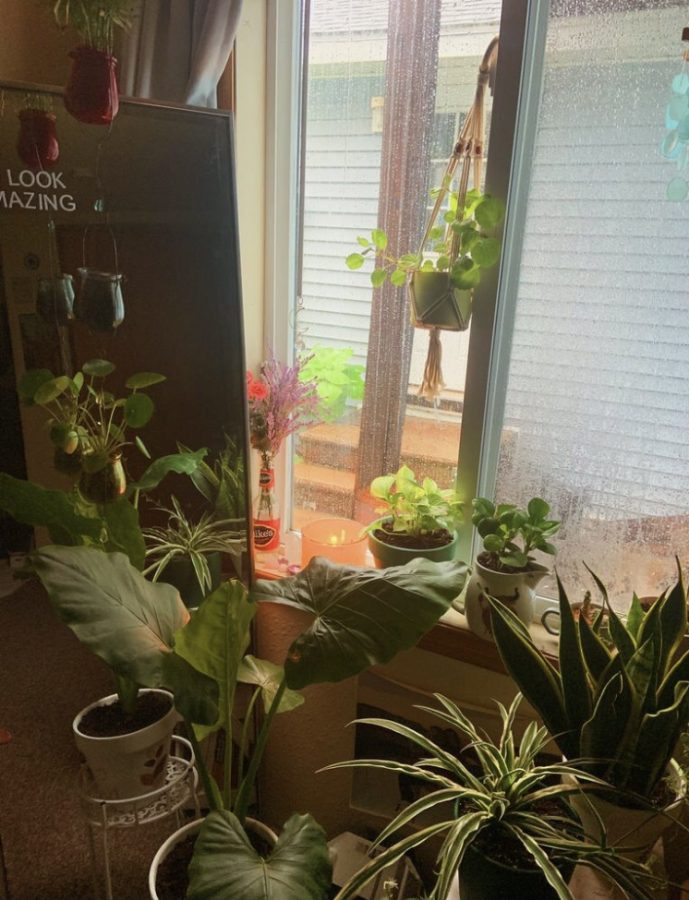Psychology of Plants
Life is stressful. Caring for plants might ease your mental load.
There are many reasons that people own houseplants. Maybe it’s a newfound COVID-19 pandemic obsession, or even a way to make someone feel more at home when they’re miles away.
Annika Wolfgram, a third-year psychology and family studies student at UW-Eau Claire, has created her own version of plant culture by creating an Instagram, or “plantstagram” to share her plant progress and gain tips from other plant enthusiasts such as herself.
“I got into the plant groove when my grandma gave me plant cuttings and taught me how to take care of them,” Wolfgram said. “They quickly took over my room and soon the porch during nicer weather.”
Wolfgram said caring for her plants has provided her a “sense of purpose from caring for each of her plants.” In terms of keeping track of her ever-expanding greenhouse, she uses the app Planta to track watering and growth cycles of each plant.
“It makes me happy to check my plant’s progress daily and add water to my propagated plants, along with watering my potted plants,” Wolfgram said.
But you don’t just need to be a college student, consumed by upcoming quizzes and exams to enjoy the therapeutic process of propagating plants and caring for cacti.
Plant culture is everywhere you look. Manas Sanyal, a local Eau Claire bartender, has accumulated over 60 houseplants, all originating from their home city, Kolkata India. They said it reminds them of, “the Kolkatain culture and being back at home.”
It’s not just people looking to remedy homesickness, it’s also people looking to alleviate stress and practice mindfulness. An article posted on BBC said many see it as a form of “self care and reset from reality, especially when their reality is moving so fast.”
Research finds that interacting with indoor plants can reduce physiological and psychological stress. Using this information, plant interaction can “increase memory retention and concentration by 20%.”
According to a study conducted by The University of Michigan’s Environment and Sustainability Schools, we can also find that the comforting effect of a natural environment has been found beneficial. Using the same source, there are psychological stability properties that are emulated when working with house plants and in turn, this “stimulates the four senses in various ways.”
Passionate plant parents can confirm that they find solace in the tranquility of tending to their own gardens, especially to divert their attention from the chaos of everyday life. As a psychology student, Wolfgram said that dealing with plants can be a form of “self-care and stress reduction.”
“I think owning plants can reduce psychological stress and give an individual a sense of purpose,” Wolfgram said. “For me, it increases productivity and makes me feel more at home with plants in your environment.”
Sue Stuart-Smith, psychiatrist, avid gardener and author of “The Well Gardened Mind,” also said how “the gardening process can be very healing and therapeutic for some.”
“People in the presence of indoor plants tend to show higher levels of trust and generosity, thus prompting a ‘sociability effect, ” Stuart-Smith said.
Stuart-Smith said that “the garden is often seen as a place of refuge and a place to remove yourself from the world outside,” even for just a moment. Many enjoy the connection between themselves and the Earth’s natural contents.
Whether you’re a freelance plant parent, or parent to 60 plants and counting, anyone can benefit from owning a house plant.
Smith can be reached at [email protected].

Anna Smith is a fourth-year journalism, psychology and legal studies + histories of race, gender, and societies student. She plans to graduate in May 2023 and pursue her dream of attending law school. When she isn't stressed about her pending legal career, she is spotted working, writing or house hunting on Zillow.












Julie Taylor • Mar 14, 2022 at 10:26 am
What an interesting article! I love raising and caring for house plants and have since I was much younger. I am now 82 years old and still love starting new plants and finding just the right light and temperatures for them to flourish!
Julie Taylor
Sturgeon Bay, WI.
M E Smith • Mar 2, 2022 at 9:20 pm
Great article!
Neil Tyson • Mar 2, 2022 at 8:11 pm
This is an excellent article with a point that everyone can (or in an odd future nearby need) listen to. The title is very eye grabbing — yet it appears as if plants are the ones with a psychology.
Keep writing please!